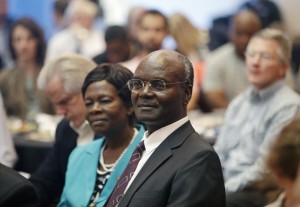
African-American Mormons discussed the ongoing challenges of belonging to a predominantly white religion Friday during a university conference designed to address the status of blacks in the faith.
Darius Gray, a pioneering black Mormon, commended leaders of The Church of Jesus Christ of Latter-day Saints for publishing an essay in 2013 that disavowed a previous ban on blacks in the lay priesthood. The essay offered the most comprehensive explanation ever from church headquarters about the ban that was in place until 1978. Still, Gray noted, only two in 10 Mormons have read the essay, limiting its impact.
The common theme at the conference at the University of Utah: Discussions about race in the Mormon religion don’t happen enough at congregational levels.
“There is a level of fear in exposing the truth behind the racist history of the church,” said Paulette Payne, a Mormon TV personality in Atlanta who moderated a panel on race and Mormon women. “When you fear something, you don’t necessarily want to expose it for what it is because it then becomes a reflection of you.”
Panels filled with academics and Mormons bookended a lunch speech from Joseph W. Sitati of Kenya, a member of a second-tier Mormon governing body called the Quorum of the Seventy.
Sitati, 63, said he came to peace with the past ban when he joined the faith in 1986 by studying past scripture and teachings. He said African Mormons aren’t preoccupied with the ban, either. He said the increase in Mormon membership in Africa, to 449,000 in 2014 from 7,600 in 1978, is evidence of that.
Issues of race and diversity within the Mormon faith bubbled up after the church selected three white men last weekend to fill vacancies on a high-level governing body, the Quorum of the Twelve Apostles.
The top 15 leaders of the religion — including the president, his two counselors and the Quorum of the Twelve Apostles — are all white men. Only one, Dieter F. Uchtdorf, is from outside the U.S. He was born in Czechoslovakia and raised in Germany.
There aren’t any blacks on the next-level leadership group, the seven-member presidency of the Quorum of the Seventy. But there are two minorities: Ulisess Soares of Brazil and Gerrit W. Gong, an Asian-American.
In the body of the first Quorum of the Seventy, two men are black: Sitati and Edward Dube of Zimbabwe. There are no black leaders from the U.S.
Though most Mormons respect the fact that top leaders are chosen through divine intervention by the church president, considered the prophet, there’s still concern over the lack of black leaders.
“It’s important for us black people to see ourselves in this church in leadership capacities,” said Payne, who was drawn to the church in part by hearing the conversion story of singer Gladys Knight.
The Utah-based religion doesn’t provide ethnic or racial breakdowns of its members, but scholars say blacks make up a small portion of the 15-million member global faith. The church also works to convert faithful around the globe, adding diversity to its rank-and-file.
About 3 percent of Mormons in the United States are African-American, the Pew Research Center estimated in 2009. About 5 percent of all worldwide members are of African descent, estimates Matt Martinich, a member of the LDS Church who analyzes membership numbers with the nonprofit Cumorah Foundation.
Maybelline McCoy, an Afro-Latina originally from Panama, expressed dismay at how few students at Mormon-owned BYU are black: 288 out of 30,000 in 2014. McCoy said she doesn’t want her three small children to feel like outsiders when they grow up, as she often did during her time at BYU when she came to Utah from Texas.




